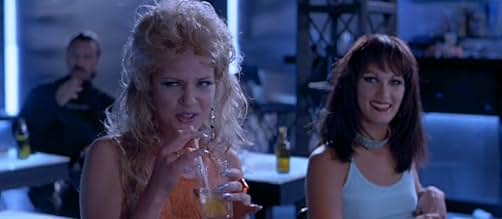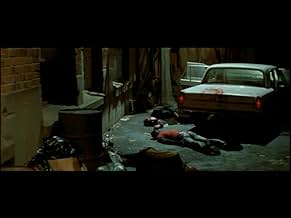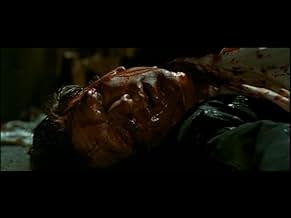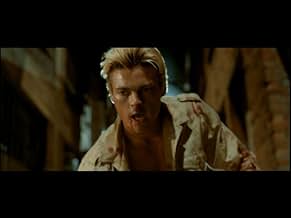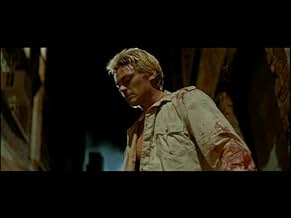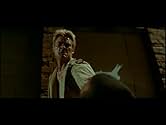Adicionar um enredo no seu idiomaRobert's wife is divorcing him for gambling etc. A strip club owner offers him work redesigning his club. Robert befriends a dancer there, who has premonitions.Robert's wife is divorcing him for gambling etc. A strip club owner offers him work redesigning his club. Robert befriends a dancer there, who has premonitions.Robert's wife is divorcing him for gambling etc. A strip club owner offers him work redesigning his club. Robert befriends a dancer there, who has premonitions.
- Direção
- Roteiristas
- Artistas
- Prêmios
- 1 vitória no total
Daniel Edwards
- Heaven
- (as Danny Edwards)
Jane Fullerton-Smith
- Candy
- (as Jane Fullerton Smith)
- Direção
- Roteiristas
- Elenco e equipe completos
- Produção, bilheteria e muito mais no IMDbPro
Avaliações em destaque
Okay, I am a Martin Donovan fan first of all, and Heaven was an incredible vehicle for Martin to show us once again his great acting skills. In fact, the entire cast did a great job. Yes, the sequence of the film was a bit confusing, but then became very surprising and enjoyable -never predictable. Martin is a master of subtlety and watching him perform is pure delight. Next to the Book of Life, this is my favorite Donovan film.
one of the best films i've seen this year. unfortunately nobody got a chance to see it because harvey and bob over at miramax decided to release it on only ONE screen. it's sad that they didn't have faith in it. martin donovan is absolutely incredible in it. it's a really remarkable film - it has the most innovative narrative structure i have seen in a film in years (including pulp fiction). It's a brilliant film - rent it when it comes out on video.
I had a premonition about this movie. Young NZ director (Scott Reynolds) makes low budget but interesting first feature ("Ugly") and gets snared by Hollywood. Makes more ambitious next film (although the budget doesn't seem to be much greater) in the style of film noir meets Tarantino (with less humour and more gore.) Bet he fluffs it.
Well, he does, up to a point. There's plenty of talent here in this familiar but painful tale of an architect (Martin Donovan) down on his uppers and suffering from a severe case of compulsive gambling trying to preserve access to his young son (Michael Langley.) He is really up against it. His beautiful but very fed-up estranged wife (Joanna Going) is having an affair with their marriage guidance counsellor (Patrick Malahide) and for good measure has appropriated his lawyer as well (there's enough professional conflict of interest here to keep a couple of misconduct tribunals going for months).
Our architect's current client, a sleazy nightclub owner (Richard Schiff), is doing his best to reduce him to penury through their late-night poker games. Into this mess floats Heaven, a six-foot four Polynesian transsexual and nightclub dancer (Danny Edwards, in a standout performance), who sees in the near future useful things like winning card hands, and some more nasty pending events. She takes a shine to the architect and helps him through the mess, but not after being pretty badly treated herself.
Really I think this film is spoiled by too much gore. It has a good intelligent storyline, fine acting, suitably grungy locations and sets, plenty of pace, imaginative time-shifting and cross-cutting (without being too obscure) and then all this stupid carnage towards the end, lovingly and lingeringly shot. Less is more!
Still, I enjoyed Patrick Malahide (unforgettable years ago as the nasty perpetually frustrated Inspector Chisholm in TV's "Minder") who plays the unethical counsellor. Danny Edwards beautifully conveys the pain of someone who can see the future but, having a rather passive nature, is not well equipped to deal with it. Still, people like Heaven do attract protectors, and, fittingly, she gets it together with Raymond (Karl Urban), the club's handsome macho bouncer.
The film was shot in Auckland, New Zealand with an NZ cast apart from (I think) four of the leads, but it appears as an identi-kit grungy urban environment from anywhere. (Though it has to be pointed out that Auckland railway station's 1930s "Georgian Maori" architecture is pretty distinctive and there are plenty of right hand drive cars of 70s vintage that never saw a US freeway). I don't know what it is about Auckland, a pretty place on a fine harbour, that makes filmmakers present it in such a way. Another recent example was "Once Were Warriors" but that was a film of great cultural relevance. This one just uses Auckland as a toilet.
The price of participation in global film culture? Though Miraxmax are listed as the producers, I'd feel happier if it carried the wording "no government money was used in the making of this film."
Well, he does, up to a point. There's plenty of talent here in this familiar but painful tale of an architect (Martin Donovan) down on his uppers and suffering from a severe case of compulsive gambling trying to preserve access to his young son (Michael Langley.) He is really up against it. His beautiful but very fed-up estranged wife (Joanna Going) is having an affair with their marriage guidance counsellor (Patrick Malahide) and for good measure has appropriated his lawyer as well (there's enough professional conflict of interest here to keep a couple of misconduct tribunals going for months).
Our architect's current client, a sleazy nightclub owner (Richard Schiff), is doing his best to reduce him to penury through their late-night poker games. Into this mess floats Heaven, a six-foot four Polynesian transsexual and nightclub dancer (Danny Edwards, in a standout performance), who sees in the near future useful things like winning card hands, and some more nasty pending events. She takes a shine to the architect and helps him through the mess, but not after being pretty badly treated herself.
Really I think this film is spoiled by too much gore. It has a good intelligent storyline, fine acting, suitably grungy locations and sets, plenty of pace, imaginative time-shifting and cross-cutting (without being too obscure) and then all this stupid carnage towards the end, lovingly and lingeringly shot. Less is more!
Still, I enjoyed Patrick Malahide (unforgettable years ago as the nasty perpetually frustrated Inspector Chisholm in TV's "Minder") who plays the unethical counsellor. Danny Edwards beautifully conveys the pain of someone who can see the future but, having a rather passive nature, is not well equipped to deal with it. Still, people like Heaven do attract protectors, and, fittingly, she gets it together with Raymond (Karl Urban), the club's handsome macho bouncer.
The film was shot in Auckland, New Zealand with an NZ cast apart from (I think) four of the leads, but it appears as an identi-kit grungy urban environment from anywhere. (Though it has to be pointed out that Auckland railway station's 1930s "Georgian Maori" architecture is pretty distinctive and there are plenty of right hand drive cars of 70s vintage that never saw a US freeway). I don't know what it is about Auckland, a pretty place on a fine harbour, that makes filmmakers present it in such a way. Another recent example was "Once Were Warriors" but that was a film of great cultural relevance. This one just uses Auckland as a toilet.
The price of participation in global film culture? Though Miraxmax are listed as the producers, I'd feel happier if it carried the wording "no government money was used in the making of this film."
Scott Reynolds may not exactly be well known; but his excellent 2001 thriller When Strangers Appear really took me by surprise, and while Heaven is not as accomplished as the aforementioned film, it's still a very good thriller that takes in multiple different elements, which are somehow combined into a mostly coherent whole. Like many post-Pulp Fiction crime thrillers, this one features a fragmented plot which is told through various flashbacks. The main character is Robert Marling; a man with a gambling addiction. He is recovering from a nasty split with his wife Jennifer, who also wants custody of their son. Robert is friends with Stanner; the proprietor of a strip club and employer of transvestite dancer Heaven. Heaven has an unusual ability to see into the future and takes a shine to Robert when she recognises him from one of her premonitions. The plot thickens when it emerges that the psychologist treating Robert is having an affair with his wife and also treating Heaven...
Most of the film is kept within the realms of possibly; the only exception to this being the mystical abilities of the title character, which comes off as being a little strange despite being integral to the plot. Initially, I had the film pegged as a rip-off of The Crying Game; but actually it doesn't make a meal of its gender-bending lead character at all. The plot does flow surprisingly well considering that it is put forward in a fragmented manner; the strong screenplay manages to put everything across in such a way that it all makes sense. There's no shortage of memorable characters, with strip club owner Stanner standing out most in that respect. The strip club itself is very well done and the director ensures that it has a fantastically sleazy atmosphere; it's just a shame that it isn't featured more! The ending is suitably strange and ambiguous; therefore suiting the film well. All in all, this is not quite a brilliant thriller; but it's well made and gripping for the duration and therefore I recommend it.
Most of the film is kept within the realms of possibly; the only exception to this being the mystical abilities of the title character, which comes off as being a little strange despite being integral to the plot. Initially, I had the film pegged as a rip-off of The Crying Game; but actually it doesn't make a meal of its gender-bending lead character at all. The plot does flow surprisingly well considering that it is put forward in a fragmented manner; the strong screenplay manages to put everything across in such a way that it all makes sense. There's no shortage of memorable characters, with strip club owner Stanner standing out most in that respect. The strip club itself is very well done and the director ensures that it has a fantastically sleazy atmosphere; it's just a shame that it isn't featured more! The ending is suitably strange and ambiguous; therefore suiting the film well. All in all, this is not quite a brilliant thriller; but it's well made and gripping for the duration and therefore I recommend it.
This film, shown at both the Montreal and Toronto film festivals, is
so original that its merits passed over the heads of the busy
reviewers.
Scott Reynolds uses a very clever device to allow the viewer to
suspend disbelief that one of the characters could accurately
foretell the future. Heaven, the seer, is a transvestite stripper in a
regular strip club. The viewer focuses on this improbability and
lets the improbability that someone can foresee the future slip into
the film's reality.
Having created a believable character that can and does foretell
the future, Reynolds is then faced with another problem. How to
keep the viewer from knowing the future. He accomplishes this
with a series of carefully staged flashbacks (and flash forwards)
that, although accurate, are out of sequence and therefore lead the
viewer to believe in a series of events that is not accurate.
I have never seen a more cleverly thought up, worked out and
executed script.
With his plan in place, Reynolds creates one of the most
improbable plots imaginable, but because we have moved beyond
suspending disbelief and become believers, one that seems very
probable.
Richard Schiff superbly portrays the character of the strip club
owner, Stanner. Stanner has hired Heaven and brought him/her
under his wing because he has turned Heaven's ability to foretell
the future into profits. Stanner, however, is also involved with
Robert Marling, played by Martin Donovan (II). I would continue to
say superbly, but the fact is, the acting in the film is first rate all
around.
Marling is going through a bitter divorce with the stunning Joanna
Going as Jennifer Marling. Jennifer is seeing the sleazy
psychiatrist Dr. Melrose played by Patrick Malahide.
And in the pivotal coincidence, Heaven is also seeing the
unbelievably evil (but nonetheless believable) Dr. Melrose
because Heaven's visions of the future trouble him/her deeply (the
visions, not the sexual ambiguity).
Marling is a down and out gambling addict, an architect who is
designing a new club Stanner has commissioned with the
millions he has earned from following Heaven's visions of the
future. Marling is forever losing money to Stanner in poker games.
Heaven sets the plot in motion by foreseeing Marling saving him
from being viciously murdered by two sadistic thugs. Heaven sets
out to reward Marling by using his/her foretelling abilities to feed
Marling information on how the cards will fall in his poker hands
with Stanner.
Evil Dr. Melrose discovers this in his sessions with Heaven. He
seduces Jennifer. Advising her on her divorce settlement, the bad
doctor tells Jennifer to hold out for the fortune her husband is
about to come into as a result of Heaven's foretelling, intending to
take the fortune for himself.
Stanner has plenty of cash but can't resist playing the angles,
deciding to burn down his club to make way for the new one
designed by Marling. He hires two homicidal maniacs to do the
task for him, the same two sadists Heaven foresees murdering
him, and it is these two who initiate the mass slaughter that
makes the film so violent.
This film is a sleeper. It will be discovered, its clever features
copied and it will become a classic. Scott Reynolds does not have
a large body of work, but any director or writer would be proud to
have this film to their credit.
so original that its merits passed over the heads of the busy
reviewers.
Scott Reynolds uses a very clever device to allow the viewer to
suspend disbelief that one of the characters could accurately
foretell the future. Heaven, the seer, is a transvestite stripper in a
regular strip club. The viewer focuses on this improbability and
lets the improbability that someone can foresee the future slip into
the film's reality.
Having created a believable character that can and does foretell
the future, Reynolds is then faced with another problem. How to
keep the viewer from knowing the future. He accomplishes this
with a series of carefully staged flashbacks (and flash forwards)
that, although accurate, are out of sequence and therefore lead the
viewer to believe in a series of events that is not accurate.
I have never seen a more cleverly thought up, worked out and
executed script.
With his plan in place, Reynolds creates one of the most
improbable plots imaginable, but because we have moved beyond
suspending disbelief and become believers, one that seems very
probable.
Richard Schiff superbly portrays the character of the strip club
owner, Stanner. Stanner has hired Heaven and brought him/her
under his wing because he has turned Heaven's ability to foretell
the future into profits. Stanner, however, is also involved with
Robert Marling, played by Martin Donovan (II). I would continue to
say superbly, but the fact is, the acting in the film is first rate all
around.
Marling is going through a bitter divorce with the stunning Joanna
Going as Jennifer Marling. Jennifer is seeing the sleazy
psychiatrist Dr. Melrose played by Patrick Malahide.
And in the pivotal coincidence, Heaven is also seeing the
unbelievably evil (but nonetheless believable) Dr. Melrose
because Heaven's visions of the future trouble him/her deeply (the
visions, not the sexual ambiguity).
Marling is a down and out gambling addict, an architect who is
designing a new club Stanner has commissioned with the
millions he has earned from following Heaven's visions of the
future. Marling is forever losing money to Stanner in poker games.
Heaven sets the plot in motion by foreseeing Marling saving him
from being viciously murdered by two sadistic thugs. Heaven sets
out to reward Marling by using his/her foretelling abilities to feed
Marling information on how the cards will fall in his poker hands
with Stanner.
Evil Dr. Melrose discovers this in his sessions with Heaven. He
seduces Jennifer. Advising her on her divorce settlement, the bad
doctor tells Jennifer to hold out for the fortune her husband is
about to come into as a result of Heaven's foretelling, intending to
take the fortune for himself.
Stanner has plenty of cash but can't resist playing the angles,
deciding to burn down his club to make way for the new one
designed by Marling. He hires two homicidal maniacs to do the
task for him, the same two sadists Heaven foresees murdering
him, and it is these two who initiate the mass slaughter that
makes the film so violent.
This film is a sleeper. It will be discovered, its clever features
copied and it will become a classic. Scott Reynolds does not have
a large body of work, but any director or writer would be proud to
have this film to their credit.
Você sabia?
- CuriosidadesThe Miramax theatrical trailer contains several shots that aren't in the film, including:
- Jennifer and Robert arguing about his 'friendship' with Stanner while driving.
- A love scene between Robert and Jennifer.
- Tree and Nicely wearing animal masks in one of Heaven's visions.
- Heaven asleep in a movie theater.
- Citações
Jennifer Marling: Can you say it yet? "My name's Robert Marling, and I'm a gambling addict."
- ConexõesReferenced in Menina dos Olhos (2004)
- Trilhas sonorasSomething for the Cat
(Henry Mancini)
Famous Music Corporation
Performed by Henry Mancini
Under license from BMG Australia
Principais escolhas
Faça login para avaliar e ver a lista de recomendações personalizadas
- How long is Heaven?Fornecido pela Alexa
Detalhes
- Data de lançamento
- Países de origem
- Idioma
- Também conhecido como
- Пророцтво
- Locações de filme
- Empresas de produção
- Consulte mais créditos da empresa na IMDbPro
Bilheteria
- Faturamento bruto nos EUA e Canadá
- US$ 2.838
- Fim de semana de estreia nos EUA e Canadá
- US$ 1.983
- 2 de mai. de 1999
- Faturamento bruto mundial
- US$ 2.838
Contribua para esta página
Sugerir uma alteração ou adicionar conteúdo ausente



